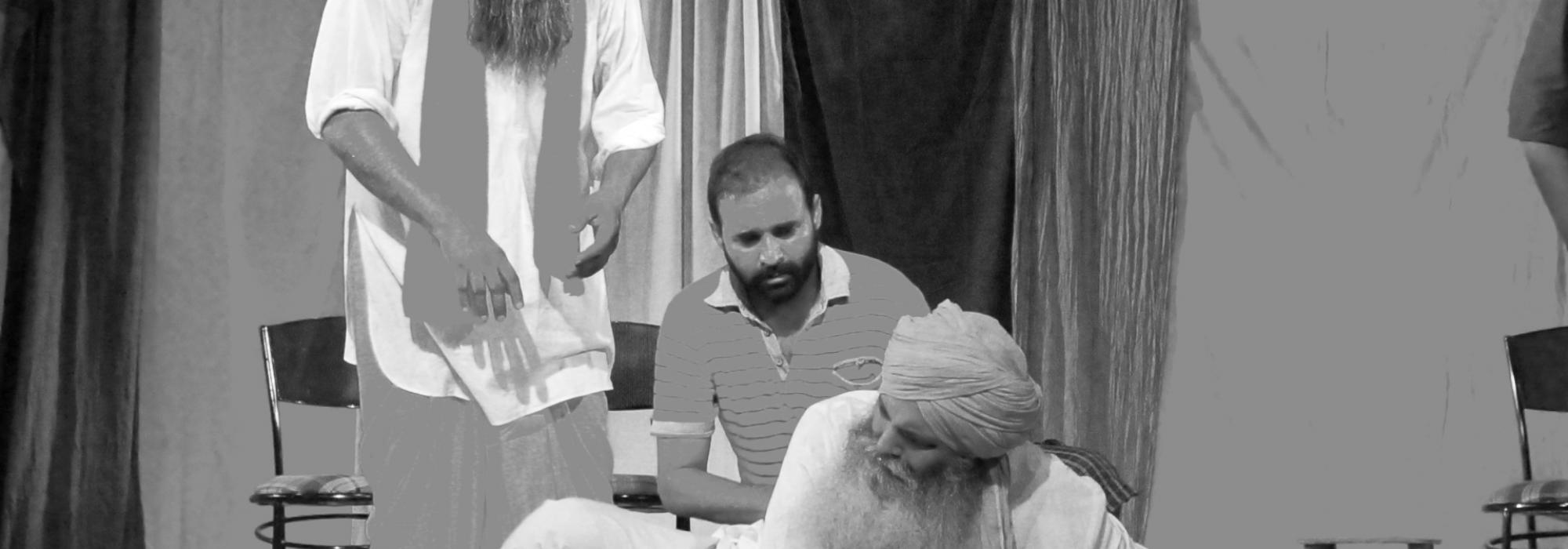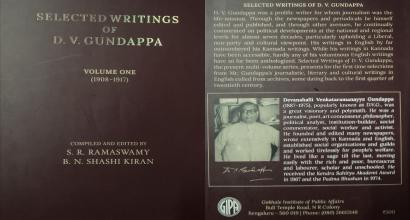Circa 1909, the drama company Sumanorama Sabhā (or Suguṇavilāsa Sabhā) of Bellary arrived in Bangalore. Kolachalam Srinivasa Rao was the director of that drama company. He was an advocate. It was Sāhukār Netkallappa[1] who helped the company by making arrangements for them in Bangalore.
Citranaḻīyamu
At that time, the passion for drama in Bellary was intense. Several educated young men and women would gather at the theatre. Sarasa Vinodini Sabhā was established a little earlier than the aforementioned Sumanorama Sabhā. I’m recalling the names of the sabhās from memory; it’s possible that the names were different.
Sarasa Vinodini Sabhā was established by the honourable Dharmavaram Krishnamacharya. He was an advocate and had gained fame from his expertise in Sanskrit and Telugu. Among his plays the most popular was Citranaḻīyamu. It is the story of Naḻa-Damayantī. In this play, Krishnamacharya has proffered his poetic ingenuity to the public using a variety of kanda-vṛttas[2] and songs. It is a lovely play. It had a charming style. While enacting the play, Krishnamacharya himself would play the role, probably that of Bāhuka, the character assumed by Emperor Naḻa when he lives incognito. The manner in which he enacted his role pleased the audience a great deal. Some poems in Citranaḻīyamu were composed keeping in mind the alignment of even the names of the rāgas with corresponding emotions. I’m unaware if people have kept such a lovely play in circulation over the last fifty years. However, I believe that it is a play that deserves to be in circulation at all times.
Raghavacharya
Dharmavaram Krishnamacharya’s nephew was the renowned T Raghavacharya. He was a BA, BL graduate and an acclaimed advocate. Along with his profession, he had cultivated the hobby of acting in dramas. Bellary’s T Raghavacharya was the foremost among talented actors of English dramas written by English poets and playwrights like Shakespeare.
Raghavacharya was the main artist of the Sumanorama Sabhā. The fact that he joined Kolachalam Srinivasa Rao’s drama company instead of his uncle’s seemed mischievous to some. However, I do not think there was any real basis for such criticism.
Kolachalam Srinivasa Rao
Kolachalam Srinivasa Rao was deeply learned in Andhra and Sanskrit literature. He belonged to the lineage of Kolachalam Mallinatha Suri—renowned as ‘Vyākhyāta Śiromaṇi’—who wrote commentaries on the works of Kālidāsa. Srinivasa Rao’s elder brother Kolachalam Venkata Rao went to England and returned a barrister. I’ve heard the same about his children. Venkata Rao earned a great deal and with that he built a town hall and a public library among other charitable activities for his town.
Srinivasa Rao, on the other hand, was attracted to music and literature. He has written a few books as well. He authored a large treatise in English titled History of the Drama. One of his well-known works in Telugu is Vijayanagara Patanamu (The Fall of Vijayanagar). The power of his sentence construction and his expertise in prose is evident in that work. He was not only a scholar but also a generous soul. He did not care for money. He helped those who sought financial or other support but without ever making them feel embarrassed or uncomfortable. He showed compassion without anyone’s request. Srinivasa Rao was that noble.
If there were twenty actors in his drama company, there would be another forty friends around. Sāhukār Netkallappa provided sumptuous meals, snacks, bedding, blankets, and so forth for all these people.
Bangalore Camp
The company’s main camp was Sītārāma Mandira building that was to the east of the Anjaneya Temple near the eye hospital at Bangalore Fort and another one, to the west of Tipu Sultan’s Summer Palace. In addition, there was another big building at Sultanpete. It was thus arranged in three locations. Among the prominent people in the company at that time were not only Srinivasa Rao and Raghavacharya, but also Kurnool Rama Rao, Vattam Shama Rao, Vattam Srinivasa Rao, Chidambara Rao, and other aficionados. An incident comes to mind.
One night, the Prahlāda play was being performed. In that, Hiraṇyakaśipu’s wife—Kayādu or something—cradles the child Prahlāda. She then sings a song:
ಸುಕುಮಾರಾ ಗುಣಶಾಲೀ
ಅಕಲಂಕಾ ನಯಶಾಲೀ॥
O delicate one, endowed with virtues
Blemishless one, endowed with wisdom
This song (probably sung in rāga Ānandabhairavi) was really charming. The role was played by Kurnool Rama Rao[3].
At around nine or ten the next morning, eight to ten friends stood in a row on the edge of the street opposite to Netkallappa’s house in Sultanpete (near the place that housed S R Nanjudayya’s school); their stare was fixed in front of them. In the building on the opposite side, standing alone on the first floor verandah with his hands on the railing was Kurnool Rama Rao. His arm was resting on the railing; cupping his beard, once in his right hand, then in his left, he was turning his face to the right for a minute and then for a minute to the left. Rama Rao did not appear to notice the row of eight to ten people on the opposite side of the street. And as for those eight to ten people, they looked at nothing but Rama Rao’s face. About five minutes would have passed thus. A friend had observed this from a distance. A few minutes later, this friend came there and asked, “What’s this? Have you become dumbfounded? Rama Rao is a male. Should you lose your mind like this over his lovely face?”
These eight to ten people who had been dumbstruck felt even more bewildered and went away feeling bashful.
Another drama organization from Bellary was a group called Student Education Society. Amongst those prominent in the group, Vattam Shama Rao was highly esteemed.
Vattam Shama Rao
Vattam Shama Rao was a good connoisseur. His English diction and his choice of words in English were lovely. He loved humour. I distinctly remember an occasion when he explained an English comic verse.
Old mother Hubbard
Went to a cupboard
To fetch her poor doggie a bone.
But when she went there
The Cupboard was bare
So the poor doggie had none.
His commentary on this verse – “Old mother – and note, she was a mother and not a father nor a brother… And she was old, not young and youthful, How pathetic! …” saying all these things, he would regale us by imitating the style of the commentator, giving excessive details. While explaining this, his voice modulation and transformation, mimicry, pursing of the lips like the aged, and his mimicking of the female voice – would make us burst out with laughter.
Kolachalam’s drama company would perform several plays in Bangalore in a time period of over a month. Vijayanagara Patana was performed five or six times. In that Raghavacharya donned the role of Rustum. It was a major attraction for the public. Raghavacharya’s facial expressions and eye-acting would touch everyone’s hearts. He would not only play roles of vīra (valour) and raudra (fury, anger) but also hāysa (comic). By nature, he loved humour and was a cheerful soul.
To be concluded.
This is the first part of the translation of the twelfth essay in D V Gundappa’s magnum-opus Jnapakachitrashaale (Volume 7) – Hrudaya Sampannaru. Edited by Hari Ravikumar.
Footnotes
[1] Rao Saheb Netkallappa was a legislator, contractor, businessman, and philanthropist.
[2] Kanda-padya (or Kanda-vṛtta) is a prosodic form in Kannada where each verse has four lines; the first and third lines are of equal length; the second and fourth lines are of equal length, but longer than the first and third lines.
[3] Although it was the character of a woman, the actor would typically be a man. It was not common for women to act on stage in the early days.









































